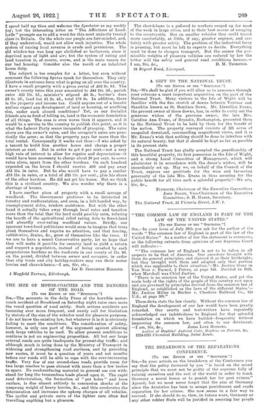"THE COMMON LAW OF ENGLAND IS PART OF THE LAW
OF THE UNITED STATES."
[To THE EDITOR OP THE " SPECTATOR."]
Sin,—In your issue of July 29th you ask for the author of the words "The common law of England is part of the law of the United States." As a matter of law the statement is erroneous, as the following extracts from opinions of our Supreme Court will indicate :—
" ` The common law of England is not to be taken in all respects to be that of America. Our ancestors brought with them its general principles, and claimed it as their birthright; but they brought with them and adopted only that portion which was applicable to their situation.'—Mr. Justice Story in Van Ness v. Pacard, 2 Peters, at page 144. Decided in 1829, when Marshall was Chief Justice.
'There is no common law of the United States, and yet the main body of the rights of the people of this country rest upon and are governed by principles derived from the common law of England, as established ae the laws of the different States.'— Mr. Justice Miller in Bucher v. Cheshire Railroad Co., 125 U.S., at page 595."
These dicta state the law clearly. Without the common law of England the development of our law would have been greatly retarded. Our courts and text-writers have repeatedly acknowledged our indebtedness to England for that splendid foundation on which we have builded—frequently without improving the common law, and often to our detriment.
Author of Hopkins' Judicial Code, Hopkins on Patents, lee. 1224-1225 Chemical Building, Saint Lewis.


































 Previous page
Previous page